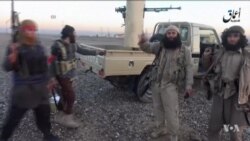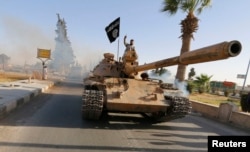The business model of Islamic State is failing, and the terror group will soon likely collapse financially, according to a detailed analysis of IS finances by the London-based International Center for the Study of Radicalization, and accounting group Ernst & Young.
Islamic State is often cited as the richest terrorist organization ever to have existed; but, the description is flawed, says report co-author professor Peter Neumann.
“IS isn’t just a terrorist organization, it is a quasi-state, which means it has territory, it has a population, and most of its income comes from that territory. It taxes people, it extracts oil, and it also loots and confiscates the property of people who’ve fled.”
Loss of territory
Neumann says that because its income is intrinsically linked to the territory it controls, the group is weakening. The Global Coalition, an association of 68 countries fighting Islamic State, says the group has lost 62 percent of its mid-2014 "peak" territory in Iraq and 30 percent in Syria.
Iraqi forces, backed by the United States, have seized control of eastern Mosul and expect to drive Islamic State out of the western half of the city in the coming weeks. IS took control of Mosul, Iraq's second-largest city, in 2014. Last October, an offensive to retake the city from the jihadist group began.
“If IS now loses Mosul, which is the commercial capital of the caliphate, a lot of its tax base will erode too. And that’s why we’re concluding that the business model of IS is about to collapse, it’s failing, it’s no longer able to sustain itself,” Neumann says.
Few paper trails
The nature of the group means an accurate analysis is difficult as it operates largely on the black market and there are few paper trails.
Available open source evidence suggests the group's annual revenue has more than halved from $1.9 billion in 2014 to a maximum of $870 million last year.
There are no signs IS has created other revenue streams, says Neumann.
“My prediction is that as IS’s territory declines, IS will revert to what they used to do before they had territory, which was to involve themselves in smuggling and in criminal extortion.”
The report's authors, however, caution the decline in income may not limit the group’s ability to carry out terrorist attacks outside its territory.






